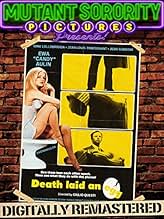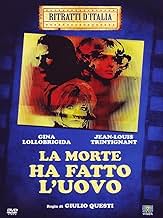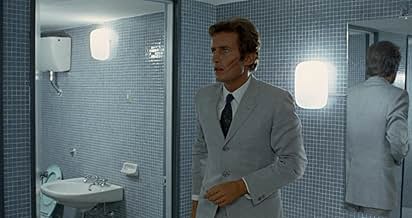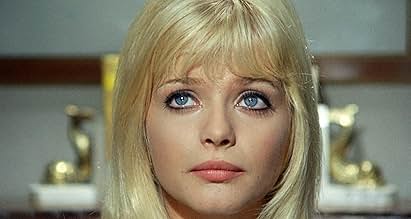IMDb RATING
5.9/10
1.8K
YOUR RATING
The depraved manager of a high-tech poultry factory is pulled into a love triangle with his domineering wife and her sexually-liberated cousin, leading to double-crosses and murder.The depraved manager of a high-tech poultry factory is pulled into a love triangle with his domineering wife and her sexually-liberated cousin, leading to double-crosses and murder.The depraved manager of a high-tech poultry factory is pulled into a love triangle with his domineering wife and her sexually-liberated cousin, leading to double-crosses and murder.
Jean-Louis Trintignant
- Marco
- (as Jean Louis Trintignant)
- Director
- Writers
- All cast & crew
- Production, box office & more at IMDbPro
Storyline
Did you know
- GoofsIn the first slasher scene, the knife blade doesn't show any blood till after 7 slashes.
- ConnectionsFeatured in Ultimate Poliziotteschi Trailer Shoot-Out (2017)
Featured review
Giulio Questi's early giallo is very different from the genre, but it can be called giallo since it has a mystery audience has no idea about until the very end. But the mystery doesn't involve the identity of the possible murderer but the various and altering relations between the characters. Marco, Anna and Gabrielle live together and work together, in a huge chicken farm / factory owned by Anna. Soon it is clear all three, plus their friends, have another things in their minds; they act what they don't say and vice versa. This gives the director Questi a great opportunity to handle topics of greed and money that easily blind.
The way how Questi handles his theme is very satiric, thus making the film close with Mario Bava's Reazione a catena / Bay of Blood 3 years later. Both films have serious theme about man's ability to turn violent in his search for monetary benefit and freedom and both films discuss this satirically, with maximal effect since comedy is often at its best when the subject stays serious and universally important. As a pure giallo mystery, the film is also quite rich since the audience has no idea what is going on until the very end when it is revealed. Questi uses very interesting editing technique that makes many of the scenes "broken", using flashbacks, dreamy/nightmarish moods and so on. This forces us to dive deeper inside the characters and their varying points of views.
The film has also an interesting topic about man's subconscious and instincts. Main character Marco is considered "morally corrupt" due to his unusual sexual preferences. But at the same time Questi shows how much there is inside human brain, needs, wills, desires, we don't necessarily want to talk about in fear of unacceptance or being classed as "sick." We are not as civilized, as perfect, as the moral codes of society try to suggest when they go after "the morally sick" Marco. There's also a very harrowing and unforgettably absurd scene at the experiment lab of the factory. The doctors have created a manipulated type of chicken that would be commercially extremely profitable to the factory while at the same time the manipulated monsters are a plentiful spitting at nature's face. Marco is against this, against the others around him while he has been named "morally wrong" and bad. Questi had important things and questions in mind and also the ability to turn them into a film.
Real themes in a giallo thriller are quite rare and Questi has done it very well. This is among the earliest but also among the very best of the giallo.
The way how Questi handles his theme is very satiric, thus making the film close with Mario Bava's Reazione a catena / Bay of Blood 3 years later. Both films have serious theme about man's ability to turn violent in his search for monetary benefit and freedom and both films discuss this satirically, with maximal effect since comedy is often at its best when the subject stays serious and universally important. As a pure giallo mystery, the film is also quite rich since the audience has no idea what is going on until the very end when it is revealed. Questi uses very interesting editing technique that makes many of the scenes "broken", using flashbacks, dreamy/nightmarish moods and so on. This forces us to dive deeper inside the characters and their varying points of views.
The film has also an interesting topic about man's subconscious and instincts. Main character Marco is considered "morally corrupt" due to his unusual sexual preferences. But at the same time Questi shows how much there is inside human brain, needs, wills, desires, we don't necessarily want to talk about in fear of unacceptance or being classed as "sick." We are not as civilized, as perfect, as the moral codes of society try to suggest when they go after "the morally sick" Marco. There's also a very harrowing and unforgettably absurd scene at the experiment lab of the factory. The doctors have created a manipulated type of chicken that would be commercially extremely profitable to the factory while at the same time the manipulated monsters are a plentiful spitting at nature's face. Marco is against this, against the others around him while he has been named "morally wrong" and bad. Questi had important things and questions in mind and also the ability to turn them into a film.
Real themes in a giallo thriller are quite rare and Questi has done it very well. This is among the earliest but also among the very best of the giallo.
Details
- Runtime1 hour 26 minutes
- Sound mix
- Aspect ratio
- 1.85 : 1
Contribute to this page
Suggest an edit or add missing content

























